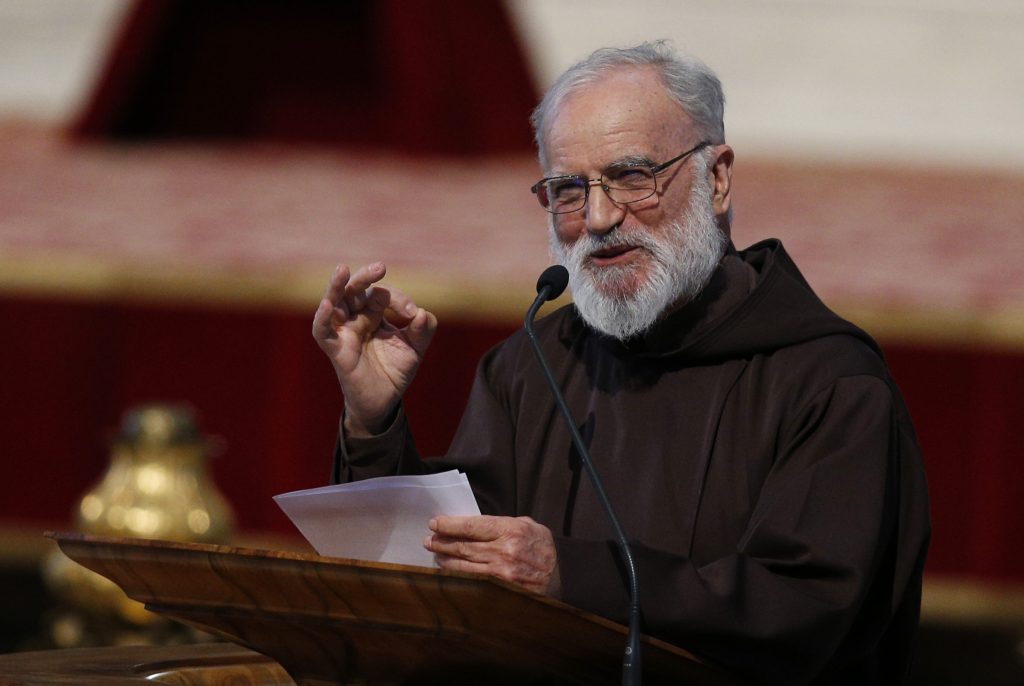ROME — When bishops from the United States meet in January to reflect on the clerical sexual abuse crisis ravaging the American Church, they will likely get a very potent, yet scriptural message on the issue from Capuchin friar Father Raniero Cantalamessa, who will lead their weeklong retreat.
Cantalamessa, 84, has served as preacher to the papal household for nearly 40 years and was recently invited to lead the Jan. 2-8 retreat, which will take place at Mundelein Seminary near Chicago. Some hope that the event will give U.S. bishops a chance to study and formulate a response to the clerical sexual abuse crisis, which since the summer has plagued the American Church.
After what some have called the “summer of scandal” for the U.S. following the release of the Pennsylvania Grand Jury report and revelations that ex-Cardinal Theodore McCarrick had been credibly accused of abusing minors and has exercised years of sexual misconduct against young priests and seminarians, Pope Francis in September suggested that the U.S. bishops scrap the agenda for their fall assembly in November, and hold a weeklong spiritual retreat instead.
Due to the tight schedule, the bishops opted to hold the retreat in January, focusing on the theme, “The mission of the apostles and of their successors,” which draws on the passage in the Gospel of Mark that says Jesus “appointed 12 — whom he also named apostles — that they might be with him and he might send them forth to preach.”
Cantalamessa, born in Ascoli Piceno, Italy, in 1934, is known for his lengthy, yet meaty homilies, often containing a strong message with numerous scriptural passages and anecdotes for his curial audience to meditate on.
A former professor of the history of ancient Christianity and a member of the International Theological Commission from 1975 to 1981, the friar has a doctoral degree in classic literature and, after resigning from his teaching positions in 1979, was tapped by St. Pope John Paul II in 1980 as preacher to the papal household.
In the role, he is responsible for preaching weekly meditations to members of the pope, members of the Roman Curia and general superiors of religious orders on Fridays during Advent and Lent. He is also responsible for preaching the homily on Good Friday, marking the only sermon not given by the pope himself during Holy Week.
Pope Paul IV first created the position of papal preacher in the mid-1500s, and his successors have all kept the tradition.
Around the year 1743, Pope Benedict XIV issued a brief reserving the role of preacher of the papal household exclusively to Capuchin friars due to “the example of Christian piety and religious perfection, the splendor of doctrine and the Apostolic Zeal” found in the order.
So far in his 38-year tenure as papal preacher, Cantalamessa has given some 300 talks and homilies to three popes: John Paul II, Benedict XVI, and Francis. When he is not preaching to the pope, he travels the world giving talks, writing books, and leading retreats.
Cantalamessa also has a long history of ties with the Catholic charismatic community, having served for 12 years as a member of the Catholic delegation for the Joint International Commission for Catholic-Pentecostal Dialogue.
He has continued to work closely with the charismatic community, and in October, shortly after being named as preacher for the U.S. bishops’ January retreat, he was tapped as ecclesiastical assistant for the new body overseeing charismatic movements in the Church, Charis, which went into effect Dec. 8.
Charis will assume the roles previously played by the International Catholic Charismatic Renewal Service and the Catholic Fraternity of Charismatic Covenant Communities and Fellowships, which will cease to exist as of June 9, on the feast of Pentecost.
Known for the boldness of his preaching, Cantalamessa has tackled the issue of clerical sexual abuse before, delivering an Advent meditation to Benedict in December 2006 suggesting that a day of fasting and penance be held for the crimes of child sexual abuse committed by Catholic clergy.
Now a common trend in many places around the world, at the time the idea was a novelty for a Church barely starting to cope with the depth and gravity of the issue.
Four years later, in his 2010 Good Friday sermon, Cantalamessa returned to the topic, implying that the widespread media criticism of the Catholic Church due to the abuse crisis was a form of anti-Catholicism, which he said could be compared to “more shameful aspects of anti-Semitism.”
When the comments led to backlash, prompting a statement from the then-Vatican spokesman Father Federico Lombardi, SJ, to say the preacher was not speaking as an official representative of the Vatican, Cantalamessa insisted he was quoting a letter sent to him from a Jewish friend.
Under the Francis papacy, he has been equally outspoken on issues such as corruption, both in society and in the Church.
With many prelates ready to strap on their seatbelts whenever Cantalamessa takes the mic, U.S. bishops are likely in for an intense start to the new year as they take Cantalamessa’s lead in diving into one of the biggest issues plaguing modern global Catholicism.
Elise Harris is the senior correspondent for Crux in Rome.
SPECIAL OFFER! 44 issues of Angelus for just $9.95! Get the finest in Catholic journalism with first-rate analysis of the events and trends shaping the Church and the world, plus the practical advice from the world’s best spiritual writers on prayer and Catholic living, along with great features about Catholic life in Los Angeles. Subscribe now!

